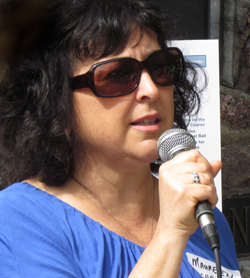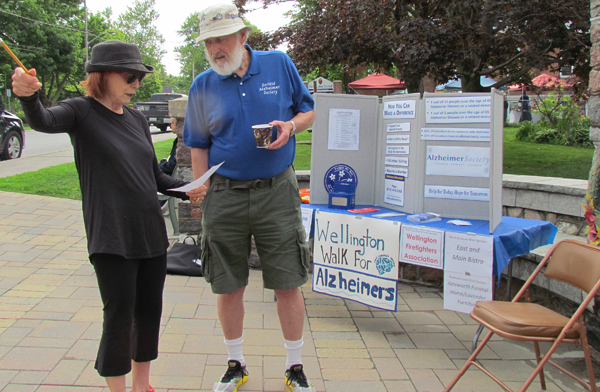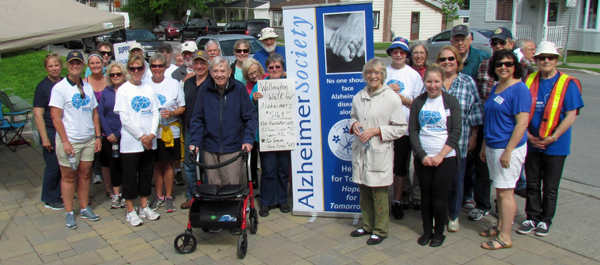Walk for Alzheimers helps Make Memories Matter – Become a friend
Administrator | Jun 18, 2015 | Comments 0
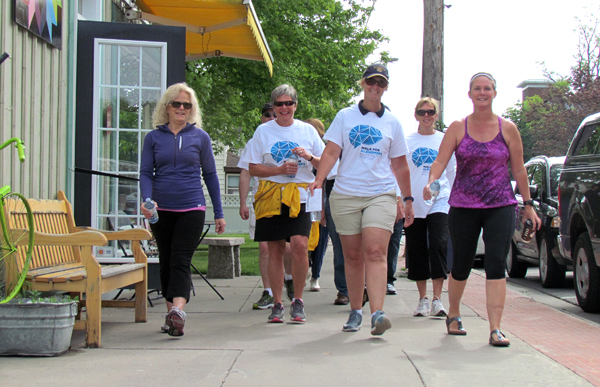 More than 40 people participated in the first ‘Walk for Alzheimers’ in Wellington last Saturday raising $5,169 for the new Hastings-Prince Edward Society.
More than 40 people participated in the first ‘Walk for Alzheimers’ in Wellington last Saturday raising $5,169 for the new Hastings-Prince Edward Society.
County residents also met the society’s new executive director Maureen Corrigan who took over from the retiring Laura Hare, interim director.
The new walk replaces the annual Walk for Memories held in 150 communities across Canada to raise funds and awareness for Alzheimer’s disease and other dementias.
By naming the disease publicly in the walk title, the Alzheimer Society hopes it is also fighting the stigma attached to it head on.
What might Canada look like if everybody had a better understanding of dementia? Help make it happen. Help the society reach 5,000 Dementia Friends by Canada Day!
Since Dementia Friends Canada launched two weeks ago, close to 3,000 Canadians have already taken a moment to learn more about dementia and commit to a simple action. CLick the link to help. http://www.dementiafriends.ca/
Through a website, video and social media, this national public engagement initiative will promote understanding, respect and dignity for those living with dementia, while helping Canadians become more aware of the small things they can do to help in their community. Simple actions such as being patient, speaking slowly and calmly, and asking short, simple questions, can help someone living with this disease to feel connected and supported.
Along the walk, participants gained clues to help answer true or false questions about Alzheimers and dementias.
Try it yourself:
1. Dementia is a normal part of aging.
2. Vascular dementia is the most common.
3. Dementia can affect people as young as 40.
4. The medication available for Alzheimer’s disease are a cure.
5. 1 in 10 Canadians over 65 have Alzheimer’s disease or a related dementia
6. Every 5 minutes someone is diagnosed with Alzheimer’s disease or a related dementia.
7. The older you are, the greater your risk of developing Alzheimer’s disease.
8. Alzheimer’s disease is contagious.
9. Difficulty with memory is the only symptom of Alzheimer’s disease.
10. Everyone who forgets things has Alzheimer’s disease.
11. I can help people who have Alzheimer’s disease.
12. Alzheimer’s disease begins about 20 years before symptoms appear
ANSWERS:
1. FALSE. Although age is the greatest risk factor for Alzheimer’s disease, dementia is NOT a normal part of aging.
2. FALSE. Dementia is a term describing symptoms of many diseases that affect the brain. Alzheimer’s disease is the most common type of dementia. Vascular dementia is the second most common. Elements of vascular dementia include TIAs and strokes.
3. TRUE. A genetic form of Alzheimer’s disease can be found in persons as young as forty. Only 5—7% of persons with Alzheimer’s disease carry the genetic variation.
4. FALSE. The medications available today can modify the symptoms caused by Alzheimer’s disease, leading to a better quality of life. Research is still looking for a cure.
5. TRUE. Recent surveys indicate that one in ten of Canadians over 65 have Alzheimer’s disease or a related dementia. With age, that number increases to one in three over the age of 85.
6. TRUE. With the wave of baby boomers arriving at age 65, the incidence of Alzheimer’s disease is increasing dramatically. Today, every 5 minutes, someone is diagnosed with Alzheimer’s disease or related dementia.
7. TRUE. The good news is that life expectancy has increased dramatically in Canada. The bad news is that age is the greatest risk factor for developing Alzheimer’s disease.
8. FALSE. Unlike the flu or colds or even HIV, Alzheimer’s disease is not contagious. You can feel secure in visiting your neighbour or family member who is living with dementia. You will not ‘catch it’.
9. FALSE. Although memory loss is the most common symptom of Alzheimer’s disease, others include:
· Getting lost in familiar places
· Difficulty doing day-to-day tasks
· Poor judgement
· Changes in personality & behaviour
· Loss of initiative
· Misplacing things
· Difficulty with numbers
· Problems with language
10. FALSE. When you lose your car keys or forget your neighbour’s name, it doesn’t mean you have Alzheimer’s disease. You may just be stressed, tired or have too much on your plate. If you are worried about yourself or someone else, pick up more information from the Alzheimer Society.
11. TRUE. It takes a community to care for someone with dementia. We all have a part to play when someone receives a diagnosis. Visit your Alzheimer Society to learn the skills that will make you a confident helper.
12. TRUE. Research is showing that the seeds of Alzheimer’s disease are sown decades before symptoms are visible. Making lifestyle choices that are healthy for your heart are also healthy for the brain. Eat wisely and exercise regularly.
* * *
Prince Edward County services available include:
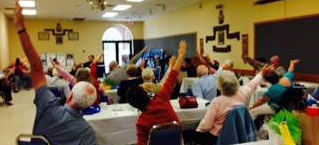 Caregiver support group – Wellington
Caregiver support group – Wellington
Every second Wednesday of the month – 2pm – 4pm
Wellington Library, 261 Main St, Wellington, ON (map)
Please call the office to register – 613-476-2085.
Facilitated by Education and Support Co-ordinator Barry Flanigan, MSW.
Caregiver Support Group – Picton
Every second Thursday of the month – 2pm
Please call the office to register – 613-476-2085.
Facilitated by Education and Support Co-ordinator Barry Flanigan, MSW.
There are many ways caregivers and family members can get the support – including advice, someone to listen, or general information.
• The Alzheimer Society Message Board is a great place for caregivers to share common experiences and advice. It is free to register.
• A support group can give you a place to talk with other caregivers who understand the disease and know just what you’re going through.
• A counsellor or trained professional can help you talk through your feelings and concerns in a more intimate setting.
LIKE US on Facebook
 www.alzheimer.ca/hpe
www.alzheimer.ca/hpe
Alzheimer Society of Hastings Prince Edward
90 King Street,
Corner of King & Paul
Picton, ON K0K 2T0
Tel: (613 )476-2085
Fax: (613) 476-1537
Filed Under: Featured Articles
About the Author:



